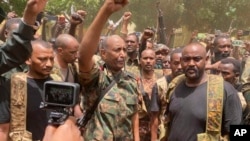Talks aimed at ending Sudan's 16-month civil war between rival military factions and addressing the dire humanitarian crisis will proceed this week, even without the Sudanese army's participation.
On Sunday, consultations between the Sudanese government and the United States in Jeddah, Saudi Arabia, ended without an agreement on whether a delegation from the army or the government would participate in the Geneva peace talks, casting doubt on the cease-fire negotiations set to begin on August 14.
The United States has invited leaders of the Sudanese Armed Forces, or SAF, and the paramilitary Rapid Support Forces, or RSF, to discuss a potential cease-fire. The RSF has confirmed its participation in the talks.
“Unfortunately, the SAF has not” accepted the U.S. invitation to take part in the peace talks, State Department deputy spokesperson Vedant Patel told VOA during Monday’s briefing.
“Our view is that talks will proceed with or without the SAF to develop shared action plans toward a nationwide secession of violence, opening additional humanitarian access and a robust monitoring and implementation regime,” Patel added.
More than a year of fighting between SAF and RSF troops has displaced nearly 10 million people across the Greater Horn of Africa country and left 26 million facing crisis-level hunger.
Earlier, U.S. Special Envoy for Sudan Tom Perriello said he has arrived in Geneva from Saudi Arabia to launch the "urgent international effort in Switzerland to end the crisis in Sudan."
“All alleged violations of international humanitarian law will be raised during upcoming negotiations in Switzerland over humanitarian access and a cessation of hostilities,” Perriello wrote on X, formerly Twitter.
A State Department spokesperson told VOA on Sunday that the U.S. will continue discussions with SAF on preparations for the cease-fire negotiations.
“In addition to consultations with the parties, we have heard from tens of thousands of civilians inside and outside of Sudan. Their message is clear: They want an end to the daily terror of shelling, starvation, and sieges, and the United States and our partners stand committed to answering that call,” Perriello wrote on X.
In Washington, U.S. officials have said there is no military solution to the crisis in Sudan. They stressed that convening national cease-fire talks — backed by unified pressure from key international stakeholders — is the only way to end the conflict, prevent the spread of famine and create space to restore the civilian political process.
At the United Nations, Secretary-General António Guterres expressed deep alarm over the evolving situation in El Fasher, the capital of North Darfur, where fierce fighting between Sudan’s rival military factions, the SAF and RSF, has had devastating consequences for civilians.
“The fighting will further exacerbate humanitarian needs in and around El Fasher at a time when famine conditions have been confirmed in Zamzam camp south of El Fasher,” said U.N. deputy spokesperson Farhan Haq.
Margaret Besheer contributed to this report.





